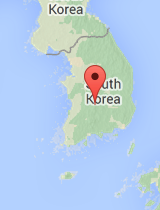Medical Summary
The health risk information presented here is summarized from Shoreland Travax®, a decision-support tool used by health care providers to perform a detailed health risk analysis based on specific locations, individual travel styles, and traveler risk behaviors. Travax provides practitioners current, independently researched malaria risk and prevention recommendations in a map-based format that goes beyond the annual WHO and US CDC statements included here. Not included here are current reports from Travax of disease outbreaks or environmental events that may pose elevated risks to travelers’ health and safety. The Providers section of this site offers a directory of health care providers who utilize Shoreland Travax for travel health counseling. Learn more about the detailed reports and maps available from these practitioners (includes links to samples).
General Information
South Korea (Republic of Korea) is an advanced economy classified as high income. Located in eastern Asia along the Sea of Japan and the Yellow Sea (south of North Korea), the climate classifications range from humid temperate in the south to humid cold (dry winter) in the north.
Vaccinations
Routine vaccinations are essential due to a persistent global rise of vaccine-preventable diseases (especially markedly high rates of diphtheria, pertussis, and measles). Prior to travel, travelers should be up-to-date with the age-appropriate and risk-based routine vaccinations recommended by their home country, which may include:
- COVID-19
- H. influenzae type B (Hib)
- Hepatitis A
- Hepatitis B: Protection is especially important for those at increased risk.
- Herpes zoster
- Human papillomavirus
- Influenza
- Measles, mumps, rubella: A single early dose is recommended for travelers aged 6-11 months.
- Meningococcal
- Pneumococcal
- Polio
- Rotavirus
- Tetanus, diphtheria, pertussis: Tdap preferred; consider an early pertussis booster for high-risk travelers.
- Varicella
Depending on your itinerary, your personal risk factors, and the length of your visit, your health care provider may offer you vaccination against Japanese encephalitis, mpox, rabies, tick-borne encephalitis, or typhoid fever.
Malaria
See also: Library article for Malaria
The following is current information as reported by the World Health Organization (WHO) and the US Centers for Disease Control (CDC):
WHO—International Travel and Health (current online update, Country List)
(2019) Limited malaria risk due exclusively to P. vivax exists mainly in the northern areas of Gangwon-do and Gyeonggi-do provinces and in Incheon City (towards the demilitarized zone or DMZ).- Recommended prevention in risk areas: A – Very limited risk of malaria transmission. Mosquito bite prevention only.
WHO Country List footnote: When available, the date of the most recent update or confirmation is indicated in parentheses in the country list. If no accurate date is indicated, the most recent update or confirmation was provided prior to 2013.
CDC—Health Information for International Travel (current online edition)
Transmission areas
- Limited to the months of March– December in rural areas in the northern parts of the provinces of Incheon (also spelled Inch'on), Gangwon (also spelled Kangwon), and Gyeonggi (also spelled Kyonggi), including the demilitarized zone (DMZ)
Drug resistance1
- None
Species
- P. vivax (100%)
Recommended chemoprophylaxis
- Atovaquone-proguanil, chloroquine, doxycycline, mefloquine, primaquine5, or tafenoquine2
1 Refers to P. falciparum malaria, unless otherwise noted.
2 Tafenoquine can cause potentially life-threatening hemolysis in people with glucose-6-phosphate-dehydrogenase (G6PD) deficiency. Test for G6PD deficiency with a quantitative laboratory test before prescribing tafenoquine to patients.
5 Primaquine can cause potentially life-threatening hemolysis in people with G6PD deficiency. Test for G6PD deficiency with a quantitative laboratory test before prescribing primaquine to patients.
Other Concerns
Travelers' Diarrhea
See also: Library article for Travelers' Diarrhea
Moderate risk exists throughout the country, with minimal risk in deluxe accommodations. Community sanitation and food safety measures may be inadequate. Some itineraries (e.g., remote destinations, austere accommodations) and activities (e.g., ecotourism, eating street or local-market food) further increase risk.
Travelers should observe food and beverage precautions, which reduce the likelihood of illness.
Travelers should carry loperamide for self-treatment of diarrhea and, if risk is moderate to high, an antibiotic to add if diarrhea is severe. Consult a knowledgeable health care provider regarding which antibiotic is appropriate for you and most effective for your destination.
Other Food-Borne Illnesses
Precautions to prevent brucellosis, seafood poisoning may be needed.
Insect- and Arthropod-Borne Diseases
Lyme disease may pose a risk. Personal protective measures are important.
Other Disease and Health Risks
Additional concerns include air pollution, hantavirus, helminths, leptospirosis, marine hazards, sexually transmitted infections, tuberculosis.
Safety and Security
See also: Library article for Safety and Security
Key Safety Risks
- Traffic collisions
- Petty crime
- Heightened crime risk for women
- Food and beverage spiking
- Scams
- Natural disasters
Key Security Threats
- Potential spillover of armed conflict
Emergency Contacts
The police emergency number is 112.

